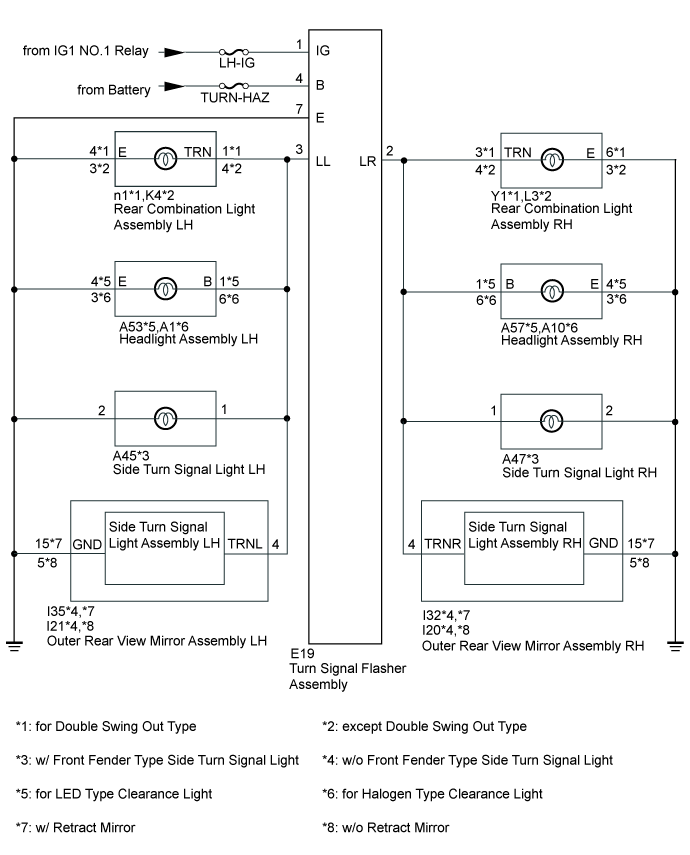Lighting System Turn Signal Light Circuit
DESCRIPTION
WIRING DIAGRAM
INSPECTION PROCEDURE
CHECK TURN SIGNAL LIGHT FUNCTION
CHECK HARNESS AND CONNECTOR (TURN SIGNAL FLASHER ASSEMBLY - BATTERY AND BODY GROUND)
CHECK HARNESS AND CONNECTOR (REAR COMBINATION LIGHT ASSEMBLY LH - TURN SIGNAL FLASHER ASSEMBLY AND BODY GROUND)
CHECK HARNESS AND CONNECTOR (REAR COMBINATION LIGHT ASSEMBLY RH - TURN SIGNAL FLASHER ASSEMBLY AND BODY GROUND)
LIGHTING SYSTEM - Turn Signal Light Circuit |
DESCRIPTION
The turn signal flasher receives a turn signal switch signal from the headlight dimmer switch, and illuminates the front turn signal light, side turn signal light and rear turn signal light.
WIRING DIAGRAM
INSPECTION PROCEDURE
- NOTICE:
- Inspect the fuses and bulbs for circuits related to this system before performing the following inspection procedure.
| 1.CHECK TURN SIGNAL LIGHT FUNCTION |
Check that the turn signal lights blink.
ResultResult
| Proceed to
|
All turn signal lights do not blink
| A
|
LH side turn signal light does not blink
| B
|
RH side turn signal light does not blink
| C
|
| 2.CHECK HARNESS AND CONNECTOR (TURN SIGNAL FLASHER ASSEMBLY - BATTERY AND BODY GROUND) |
Disconnect the turn signal flasher connector.
Measure the voltage according to the value(s) in the table below.
- Standard Voltage:
Tester Connection
| Condition
| Specified Condition
|
E19-1 (IG) - Body ground
| Ignition switch ON
| 11 to 14 V
|
Ignition switch off
| Below 1 V
|
E19-4 (B) - Body ground
| Always
| 11 to 14 V
|
Measure the resistance according to the value(s) in the table below.
- Standard Resistance:
Tester Connection
| Condition
| Specified Condition
|
E19-7 (E) - Body ground
| Always
| Below 1 Ω
|
Text in Illustration*a
| Front view of wire harness connector
(to Turn Signal Flasher Assembly)
|
| | REPAIR OR REPLACE HARNESS OR CONNECTOR |
|
|
| OK |
|
|
|
| PROCEED TO NEXT SUSPECTED AREA SHOWN IN PROBLEM SYMPTOMS TABLE (Click here) |
|
| 3.CHECK HARNESS AND CONNECTOR (REAR COMBINATION LIGHT ASSEMBLY LH - TURN SIGNAL FLASHER ASSEMBLY AND BODY GROUND) |
Disconnect the E19 turn signal flasher connector.
for Double Swing Out Type:
Disconnect the n1 rear combination light LH connector.
Measure the resistance according to the value(s) in the table below.
- Standard Resistance:
Tester Connection
| Condition
| Specified Condition
|
n1-1 (TRN) - E19-3 (LL)
| Always
| Below 1 Ω
|
n1-4 (E) - Body ground
|
n1-1 (TRN) - Body ground
| Always
| 10 kΩ or higher
|
except Double Swing Out Type:
Disconnect the K4 rear combination light LH connector.
Measure the resistance according to the value(s) in the table below.
- Standard Resistance:
Tester Connection
| Condition
| Specified Condition
|
K4-4 (TRN) - E19-3 (LL)
| Always
| Below 1 Ω
|
K4-3 (E) - Body ground
|
K4-4 (TRN) - Body ground
| Always
| 10 kΩ or higher
|
| | REPAIR OR REPLACE HARNESS OR CONNECTOR |
|
|
| OK |
|
|
|
| PROCEED TO NEXT SUSPECTED AREA SHOWN IN PROBLEM SYMPTOMS TABLE (Click here) |
|
| 4.CHECK HARNESS AND CONNECTOR (REAR COMBINATION LIGHT ASSEMBLY RH - TURN SIGNAL FLASHER ASSEMBLY AND BODY GROUND) |
Disconnect the E19 turn signal flasher connector.
for Double Swing Out Type:
Disconnect the Y1 rear combination light RH connector.
Measure the resistance according to the value(s) in the table below.
- Standard Resistance:
Tester Connection
| Condition
| Specified Condition
|
Y1-3 (TRN) - E19-2 (LR)
| Always
| Below 1 Ω
|
Y1-6 (E) - Body ground
|
Y1-3 (TRN) - Body ground
| Always
| 10 kΩ or higher
|
except Double Swing Out Type:
Disconnect the L3 rear combination light RH connector.
Measure the resistance according to the value(s) in the table below.
- Standard Resistance:
Tester Connection
| Condition
| Specified Condition
|
L3-4 (TRN) - E19-2 (LR)
| Always
| Below 1 Ω
|
L3-3 (E) - Body ground
|
L3-4 (TRN) - Body ground
| Always
| 10 kΩ or higher
|
| | REPAIR OR REPLACE HARNESS OR CONNECTOR |
|
|
| OK |
|
|
|
| PROCEED TO NEXT SUSPECTED AREA SHOWN IN PROBLEM SYMPTOMS TABLE (Click here) |
|

